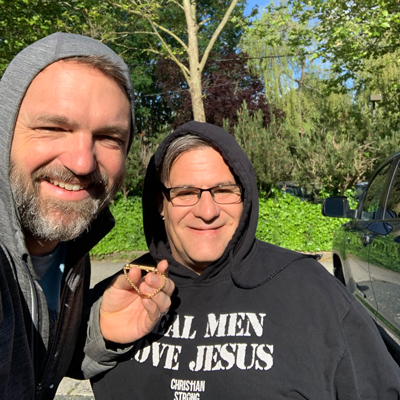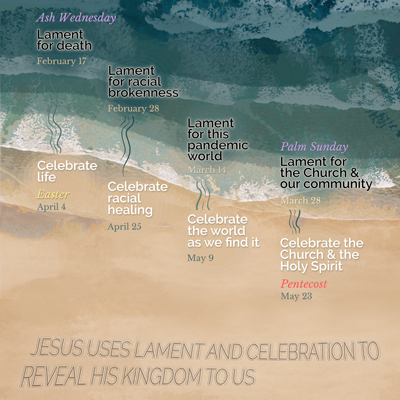NWC pastor says this year’s Easter season ‘has been influenced by George Floyd’s murder’
by Paul Seebeck | Presbyterian News Service

Spring Church, a new worshiping community in Bellingham, Washington, gathers for online worship. (Photo by Jessie Bloss)
LOUISVILLE — Jessie Bloss remembers how helpless she felt.
“It was that overwhelming feeling of not knowing how to respond,” she said.
The Rev. Matt McCoy, pastor of Spring Church, a new worshiping community in Bellingham, Washington, also remembers what he felt last year when he saw the white police officer put his knee on the neck of George Floyd, who is Black, for 8 minutes and 46 seconds until Floyd stopped breathing.
“For us, the Easter season this year has been influenced by George Floyd’s murder,” McCoy said.
As McCoy and Bloss, who is Spring Church’s only employee, spoke about how they felt that day — and about the twin pandemics of COVID-19 and racial injustice unfolding in the country — they wanted to make sure they and their congregation never forgot. Because of how polarized America was becoming, McCoy said it was important for him to get non-American voices involved in what was happening to help determine their response.
As he talked about the racial brokenness, several people recommended “Healing our Broken Humanity” from the Global Church Project. By October, Spring Church started a monthly online small group around a seven-session film series provided by the GPC on race, justice and reconciliation — which called for racial healing.

The Rev. Matt McCoy supporting one of Spring Church’s friends, Michael, as he prepared to interview at a local homeless shelter for a full-time job. This photo was posted on social media and many people inside and outside of Spring Church’s community prayed during his interview and were thrilled when Michael got the job. (Photo by Matt McCoy)
With Lent and Easter approaching, McCoy and Bloss began to collaborate on how they would incorporate what they were learning into worship to help the church journey deeper into the death and resurrection of Jesus. One of the big ideas they’d been working with is that Jesus uses lament and celebration to reveal God’s kingdom to us. So, they began to ask, “How do we lament together? What does it mean to participate in the psalms of lament? How do we write our own lament?”
According to the Rev. Dr. David Gambrell, associate for worship in the PC(USA) Office of Theology and Worship, the practice of lament is an appropriate form of worship and prayer for the season of Lent.
“The psalms of lament provide a model for us — a way to acknowledge the contrast between the evil, injustice and violence of this world and the promise of God’s realm of righteousness, justice and peace,” he said.
In the illustration below, you can see what Spring Church came up with for the bi-weekly worship services during Lent and Easter.

Spring Church is using psalms of lament during Lent to deal with the twin pandemics of COVID-19 and racial injustice.
In each lament, Spring Church prays from Psalm 90, in the Message. The opening and closing words sound the same from week to week:
“God, in sadness we come to you. We all end up in the same place — we all come from the dust, and we all return to the dust.
“And help us to love as you love, even in the valley of the shadow of death.”
In the middle of the lament are prayers from community members that Bloss includes, such as these from the recent lament on racial brokenness:
- “We don’t want to feel awkward as we try to build relationships with someone different than ourselves, who is not in our circle or neighborhood.”
- “We hold onto the notion of America as a beacon of your freedom because
that’s what we’ve been taught, and we like to believe that we can save the world.” - “We are so sorry that we don’t pray and ask for your guidance with opening our eyes and hearts to our own sin, exclusion and compliance with injustice.”
- “We’re too distracted, too tired, and too busy to lean into a broken space that is this big. We don’t trust that you’ll be there to sustain us when we can’t figure out how to take the right next step.”
As the church and community pray these laments, they’ve begun to recognize at a deeper level how important it is to remember the tragedies that are occurring. McCoy sees how it has sharpened their ability to remember the losses that have occurred.
“Because without lament we lose our memory,” he said. “Lament is a trip to the funeral home, where things are utterly broken and there’s nothing we can do about it.”

Play is a vital part of worship at Spring Church. Here Jessie Palmer (middle) holds a sign taken for a time of play at a pre- COVID worship service, as the Rev. Matt McCoy in the back (right) look on. (Photo by Elizabeth Boyle)
And yet McCoy describes lament as painful and beautiful, because the Spirit uses it to meet us in our broken places.
“The psalms of lament give us permission to be honest with our prayer and worship,” Gambrell said. “There is nothing we cannot bring to God — anger, fear, grief, guilt, despair. The promise of Christ’s resurrection is that God is working to transform our suffering into redemption, our sin into salvation and our death into life.”
For Bloss, this practice of lament during Lent has given her and Spring Church a new way to experience God together.
“It’s given us a tool for our spiritual toolbox,” she said. “It didn’t feel good to be so overwhelmed in that moment when George Floyd was killed, not knowing what to do. Learning this now feels so important, to take the focus off of myself and more on the church and the community of God’s children entering into this work of racial healing.”
Spring Church is part of the PC(USA)’s churchwide movement which the 220th General Assembly (2012) declared a commitment to that would result in the creation of 1001 worshiping communities by 2022. At a grassroots level, some 550 diverse NWCs have formed across the nation.
![]() You may freely reuse and distribute this article in its entirety for non-commercial purposes in any medium. Please include author attribution, photography credits, and a link to the original article. This work is licensed under a Creative Commons Attribution-NonCommercial-NoDeratives 4.0 International License.
You may freely reuse and distribute this article in its entirety for non-commercial purposes in any medium. Please include author attribution, photography credits, and a link to the original article. This work is licensed under a Creative Commons Attribution-NonCommercial-NoDeratives 4.0 International License.
Categories: Evangelism & Discipleship, Matthew 25, Worshiping Communities
Tags: 1001 new worshiping community, george floyd, global church project, healing our broken humanity, jessie bloss, lament, office of theology and worship, psalms of lament, racial injustice, rev. dr. david gambrell, rev. matt mccoy, spring church
Ministries: 1001 New Worshiping Communities, Evangelism, Theology, Formation & Evangelism, Matthew 25 in the PC(USA): Join the Movement